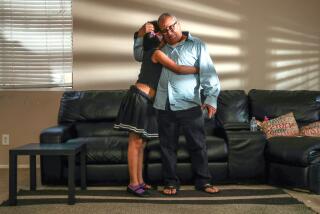The Welcome Gift of a Friend’s Healthy Heart
CHICAGO — They were neighbors, schoolmates and friends and between them, they had one sound heart.
“The first thing that went through my mind is that a friend of mine is dead,” 18-year-old Maria Ortiz said Wednesday from her bed at the University of Illinois-Chicago Hospital, where she is recovering from heart transplant surgery after receiving a surprise gift--the heart of a friend.
“Now I’ve got a chance . . . and I’ll be real happy because I know the girl and I know most likely how she was and I’ll feel better than having a stranger’s heart in me,” she said, adding, “At least I knew her.”
Ortiz lived all her life with a weakening heart muscle. After an attack Nov. 6, she was brought to the intensive care unit at Illinois Masonic Hospital, where doctors feared she had only days left.
Another Mother
She began to accept that she might never see her 4-month-old daughter grow up. In a waiting room nearby, her mother, Carmen Geliga, struck up a conversation with another woman whose daughter was in the same unit with a neurological disorder that had left her brain dead but with a healthy heart.
Geliga had no idea then that their daughters had exchanged greetings at the neighborhood pool and talked in the halls at Roberto Clemente High School before Maria dropped out.
“I wanted to ask her, but I couldn’t, because it seemed very cruel to come out and say, ‘Please, give us her heart,’ ” Geliga recalled.
Instead, she went home and prayed. When she returned to the hospital, Geliga learned the woman had asked to speak with her. “I had sorrow for her because she was losing her daughter and it’s hard to accept because her daughter was leaving and mine was going on. . . . Then she just says to me, ‘I want to donate my daughter’s heart so that your daughter can go on living.’
Friends Knew
Both young women were moved to the University of Illinois Hospital, but neither Ortiz nor her mother knew the donor was a friend until other friends of the two teen-agers made the connection.
Doctors say Ortiz’s chances for survival are promising.
Candace Wiberg, organ procurement coordinator at the hospital, said doctors bypassed a state protocol for choosing a recipient from among all eligible patients because the donor’s mother “likely wouldn’t have donated it unless she knew Maria would get it.”
Organ rejection remains a concern, but medical literature suggests Ortiz’s chances of survival are 80% or better through the first year and 60% or better through five years.
“They’re probably better than that,” said Dr. Sidney Levitsky, head of cardiothoracic surgery at University of Illinois Hospital. “In recent years, better anti-rejection drugs have improved the chances of survival.”
Ortiz says she has occasional bouts of sadness over her friend’s fate, and promises one of her first trips when she returns home will be to visit her friend’s mother.
Ortiz might find additional comfort in the story of Donna Ashlock, a Patterson, Calif., girl who nearly three years ago received a transplant from a high school admirer. Felipe Garza, who was 15 at the time, died of a brain hemorrhage after telling his parents he wanted Donna to have his heart.
Ashlock has been hospitalized several times for episodes of organ rejection. But with medication and a diet modified to lower cholesterol and salt intake, she has gone on to live a normal life.
Ortiz hopes to do the same.
More to Read
Sign up for Essential California
The most important California stories and recommendations in your inbox every morning.
You may occasionally receive promotional content from the Los Angeles Times.










